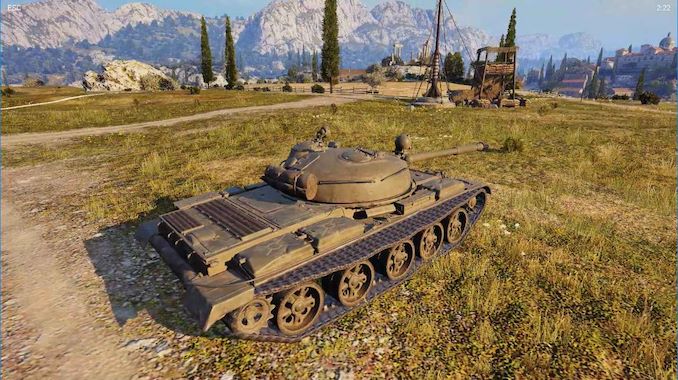The AMD Ryzen Threadripper 3960X and 3970X Review: 24 and 32 Cores on 7nm
by Dr. Ian Cutress, Andrei Frumusanu & Gavin Bonshor on November 25, 2019 9:05 AM ESTGaming: World of Tanks enCore
Albeit different to most of the other commonly played MMO or massively multiplayer online games, World of Tanks is set in the mid-20th century and allows players to take control of a range of military based armored vehicles. World of Tanks (WoT) is developed and published by Wargaming who are based in Belarus, with the game’s soundtrack being primarily composed by Belarusian composer Sergey Khmelevsky. The game offers multiple entry points including a free-to-play element as well as allowing players to pay a fee to open up more features. One of the most interesting things about this tank based MMO is that it achieved eSports status when it debuted at the World Cyber Games back in 2012.
World of Tanks enCore is a demo application for a new and unreleased graphics engine penned by the Wargaming development team. Over time the new core engine will implemented into the full game upgrading the games visuals with key elements such as improved water, flora, shadows, lighting as well as other objects such as buildings. The World of Tanks enCore demo app not only offers up insight into the impending game engine changes, but allows users to check system performance to see if the new engine run optimally on their system.
All of our benchmark results can also be found in our benchmark engine, Bench.
| AnandTech | IGP | Low | Medium | High |
| Average FPS |  |
 |
 |
 |
| 95th Percentile |  |
 |
 |
 |












245 Comments
View All Comments
PeachNCream - Tuesday, November 26, 2019 - link
Very much agree with this statement. Desktops are a shrinking market segment. Mainstream home users and corporate office computing assets are generally now laptops regardless of whether or not the mobility makes sense or is a necessity. Yes, there is a market for desktop computers and that market does include massively parallel workloads that benefit from lots of cores/threads, but the center of mass in terms of money in CPU sales has shifted to portable computing where AMD is still lagging due mainly to power consumption and heat output. The I/O die design AMD uses is not so great in that sense and Intel still has an advantage in the mobiel sector.Xyler94 - Tuesday, November 26, 2019 - link
Both of you are actually wrong.Intel doesn't care about laptops, it's a side project basically. Both Intel and AMD want Server space. Servers are the heart of the market. Especially Supercomputers. Intel wouldn't care one bit if AMD took 25% of the laptop market, but you can see Intel scrambling and panicking at every single percent AMD gains in the Server Market.
Laptop CPUs are so little margin, Intel wouldn't actually care if people buy AMD. Servers and HEDT processors are such high margin, they'd rather 1 person buy a Xeon or 2066 processor than 10 people buying laptops. It's all about profits, not units sold.
PeachNCream - Tuesday, November 26, 2019 - link
Have you looked at Intel and/or AMD's income breakdowns out of their financial reports? I have. You're assertion is not correct.Korguz - Tuesday, November 26, 2019 - link
" Desktops are a shrinking market segment " im not so sure about that... no one i know wants a notebook, for portability, they have their phones or tablets for that...upanddown - Monday, November 25, 2019 - link
Your revenue numbers don't mean anything. 15 years ago Nokia was also unbeatable, as well as Yahoo, MySpace etc..For Intel, there is a chance that similar to "after-Athlon" era will never come again.
Xyler94 - Monday, November 25, 2019 - link
Especially since the bribes are what made Intel keep goingdrothgery - Monday, November 25, 2019 - link
No, what made Intel keep on going was AMD's lack of manufacturing capacity (they couldn't have supplied much more than 25% of the CPU market in the Athlon 64 X2 era even if they wanted to), inferior laptop CPUs, and lack of infrastructure to support their server/workstation CPUs. Since going fabless, they're nowhere near as capacity constrained now, and may have more of the server infrastructure figured out... but Zen 3 doesn't have anywhere near the advantage on 10th-gen Core that Athlon 64 X2 derivatives had on Pentium 4 derivatives, either.If Intel can get cores/$ and total core counts reasonably close to EPYC and TR (which is likely), they'll be fine in the long run.
Korguz - Monday, November 25, 2019 - link
drothgery you didnt hear about how intel would bribe and threaten OEMs and the like NOT to use amd products ? thats what hurt amd way back when, thats why intel payed a billion or so to amd to settle that.. what advantage ?? zen 2 has more IPC then intel, why do you think intel needs such high clock speeds to compete with lower clocked cpus ??Xyler94 - Tuesday, November 26, 2019 - link
You don't know the history of the mid 2000s, do you?drothgery - Tuesday, November 26, 2019 - link
Reality and AMD fanboy mythology are not the same.Did Intel do some shady things in the P4 era? Yes. But that wasn't the biggest reason why AMD failed to gain more ground than they did on Intel then.
Did AMD have the manufacturing capacity to handle a significantly bigger market share than they actually got? No.
Did Opeteron have serious infrastructure issues vs Xeon? Yes, they did.
Did AMD's laptop chips suck compared to Pentium M and its follow-ons? Also yes.